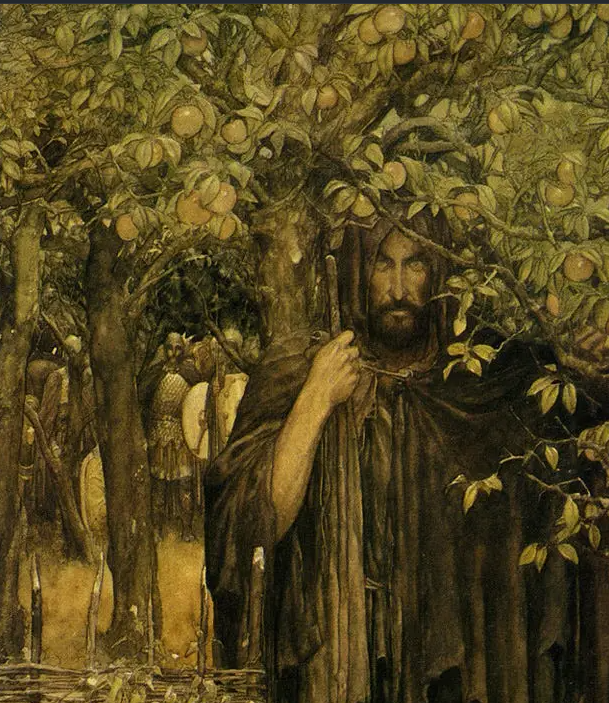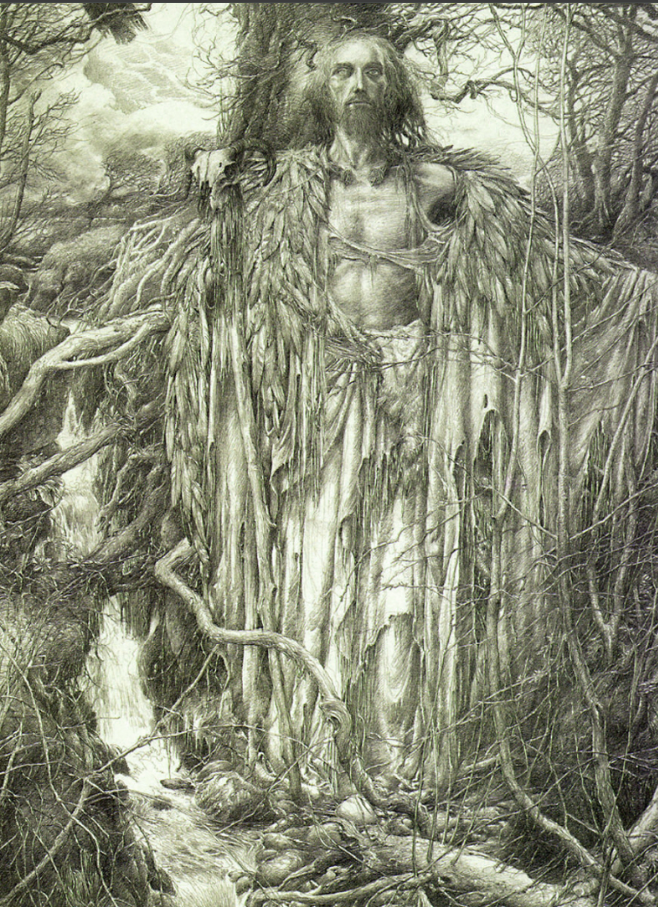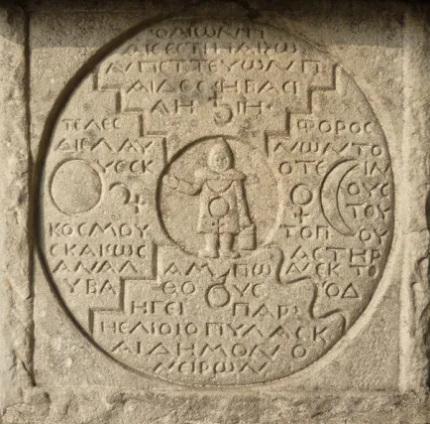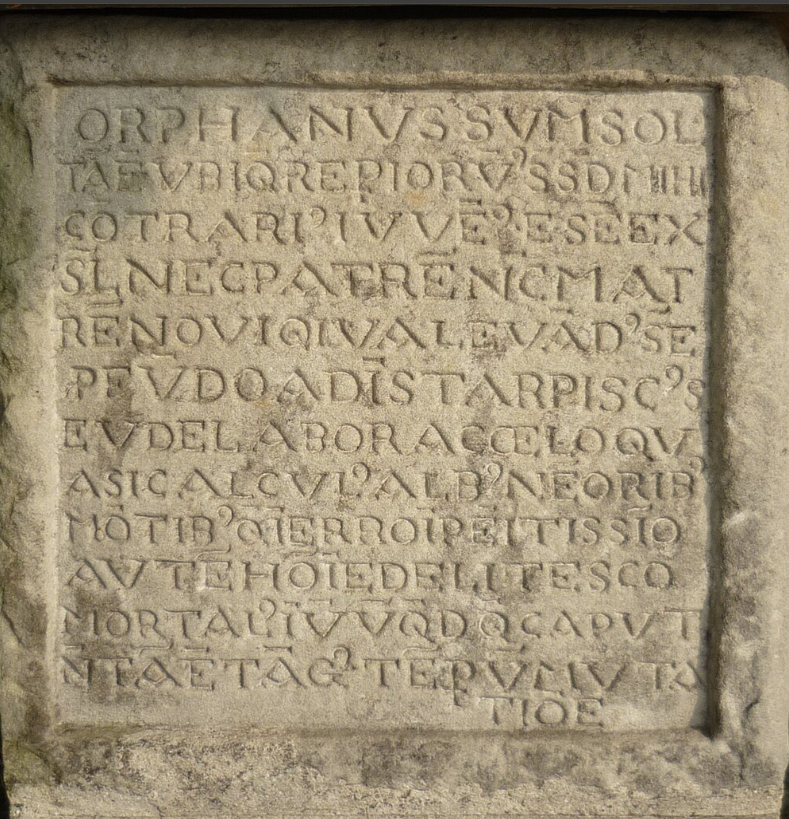The Original Merlin: Myrddin Wyllt

Source of Images: Alan Lee
Celtic Legends – The Real Merlin – Myrddin Wyllt/ Merlin the Wild
Unlike the figure known today, Geoffrey of Monmouth actually combined two characters to create the more famous Merlin.
His writings combined existing stories of Myrddin Wyllt (Merlin the Wild) and historical Romano-British war leader Ambrosius Aurelianus.
He created Merlin Ambrosius (Myrddin Emrys in Welsh) who became extremely popular, especially in Wales.
So what is recorded about Myrddin Wyllt?
Myrddin was born in the ancient town of Carmarthen in South Wales.
Like his contemporary and friend, Taliesin, he was a Bard and wrote several poems in The Black Book of Carmarthen and The Red Book of Hergest.
Later in life, Myrddin served King Gwenddoleu ap Ceidio as Chief Bard in the late sixth century.
Gwenddoleu ruled in Arfderydd (now Arthuret) in the area of South-West Scotland and North West England in the area around Hadrian’s Wall and Carlisle.
In 573 the Battle of Arfderydd was fought.
An allied army of various forces came up against Gwenddoleu, including King Riderch Hael of Strathclyde.
After Gwenddoleu was defeated and killed, Myrddin went mad and fled into the Caledonian forest and lived among the animals.
Subsequent assassinations and defeats lead to the collapse of Celtic kingdom alliances before the Scots, Angles and Picts.
Although driven mad, whilst living among the animals, Myrddin drew close to nature and developed the gift of prophesy.
He predicted future victory for the Celtic peoples of Britain and a time when they would join together and drive the Angles and later the Normans back into the sea.
A single Latin translation (from a lost Cornish-language) Prophecy of Merlin exists in the Vatican library.
St. Kentigern (also known as Mungo) comes across Myrddin as a naked, hairy madman in a deserted place.
He explains that he was condemned to wander in the company of beasts, because he caused the deaths of all persons killed in battle on the plain between Liddel and Carwannok.
Myrddin then leaps up and flees back into the wilderness.
He reappears several times more and on the last occasion asks St. Kentigern for the Sacrament and prophesies his own triple death.
Later that same day shepherds of King Meldred capture him. He is beaten with clubs, cast into the river Tweed and then pierced by a stake, thus fulfilling his prophecy.
Merlin, has of course, become a literary figure through Geoffrey of Monmouth, who connected him with King Arthur.
However, looking at the earliest history of Merlin, there are no records of him serving Arthur. That doesn’t mean he never knew Arthur.
Merlin is recorded as a friend of Taliesin, who does accompany Arthur into the Celtic Underworld, on a dangerous voyage, so would have been aware of Arthur and it is likely that their paths crossed at some point.
Source: Andy Gibbons
From the Brittanica:
Merlin, enchanter and wise man in Arthurian legend and romance of the Middle Ages, linked with personages in ancient Celtic mythology (especially with Myrddin in Welsh tradition).
He appeared in Arthurian legend as an enigmatic figure, fluctuations and inconsistencies in his character being often dictated by the requirements of a particular narrative or by varying attitudes of suspicious regard toward magic and witchcraft.
Thus, treatments of Merlin reflect different stages in the development of Arthurian romance itself.
Geoffrey of Monmouth, in Historia regum Britanniae (1135–38), adapted a story, told by the Welsh antiquary Nennius (flourished c. 800), of a boy, Ambrosius, who had given advice to the legendary British king Vortigern.
In Geoffrey’s account Merlin-Ambrosius figured as adviser to Uther Pendragon (King Arthur’s father) and afterward to Arthur himself.
In a later work, Vita Merlini, Geoffrey further developed the story of Merlin by adapting a northern legend about a wild man of the woods, gifted with powers of divination.
Early in the 13th century, Robert de Borron’s verse romance Merlin added a Christian dimension to the character, making him the prophet of the Holy Grail (whose legend had by then been linked with Arthurian legend).
The author of the first part of the Vulgate cycle made the demonic side of Merlin’s character predominate, but in later branches of the Vulgate cycle,
Merlin again became the prophet of the Holy Grail, while his role as Arthur’s counsellor was filled out; it was Merlin, for example, who advised Uther to establish the knightly fellowship of the Round Table and who suggested that Uther’s true heir would be revealed by a test that involved drawing a sword from a stone in which it was set.
It also included a story of the wizard’s infatuation with the Lady of the Lake, which eventually brought about his demise.




